Menu
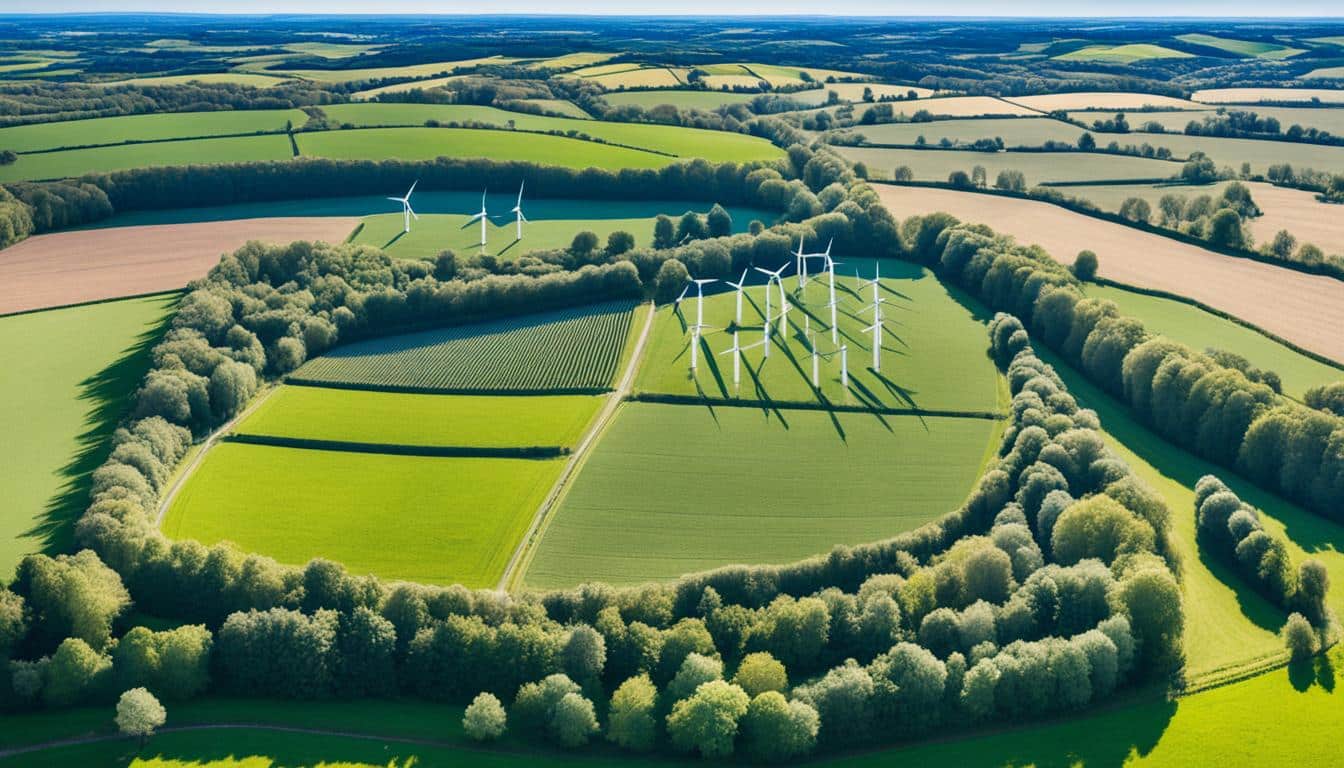
Between 2016 and 2021, the UK put in over £2.6 billion to help farms. This big investment shows the UK is serious about changing how we farm. Thanks to the UK Climate Change Act, the Department for Environment, Food and Rural Affairs (Defra) is pushing for a greener economy. This work aims to make our food and farming some of the best in the world.
The Agricultural Transition Plan from 2021 to 2024 is like a guide for farmers. It helps them update how they farm, so they can do well in a changing, eco-friendly world.
The UK’s Climate Change Act leads the way in changing how we farm to fight climate change. It focuses on cutting harmful emissions from farming. It also switches money from general payments to specific projects that help the environment and animal welfare. This change plan is key for using money wisely between 2021 and 2027.
Temperatures around the world are rising. Since the start of industry, the Earth got 1.1°C hotter. The UK is no exception. In the last ten years, our average temperature rose by 1.0°C compared to the period from 1961 to 1990. The choices we make now are crucial. If we don’t act, we could see temperatures above 40°C in parts of the UK by 2070. Acts like the UK’s Climate Change Act are more important than ever to tackle these issues.
The UK’s Climate Change Act was born in 2008, making the UK a leader. It set targets to reduce greenhouse gases to zero by 2050. This law demands that we keep working on ways to lower our climate impact and manage climate risks smartly.
This Act is also about changing how we support farmers. Money is used to improve the environment and animal well-being. It encourages farmers to use eco-friendly methods. These methods help meet the UK’s environmental goals.
The Climate Change Committee (CCC) was set up because of the Act. This group checks if we’re making real progress. It also makes sure that everyone sticks to the rules. This kind of oversight is crucial to avoid fines and keep the promise of the Act.
The sea levels are rising, and so are the temperatures. This is why we need a full-on approach to climate change. The UK’s plan is always updating. It uses new science, tech, and economics to keep making positive changes in farming.
So, the UK Climate Change Act is changing how we think about farming. It’s all about looking after the environment better. By focusing on eco-health and cutting emissions, this Act takes us towards farming that’s better for our planet.
Environmental policies in the UK are changing how we farm sustainably. They highlight the urgent need to tackle climate change in farming to keep our farmlands healthy and productive. Farmers are now working in an environment that values both looking after the land and running efficient farms.
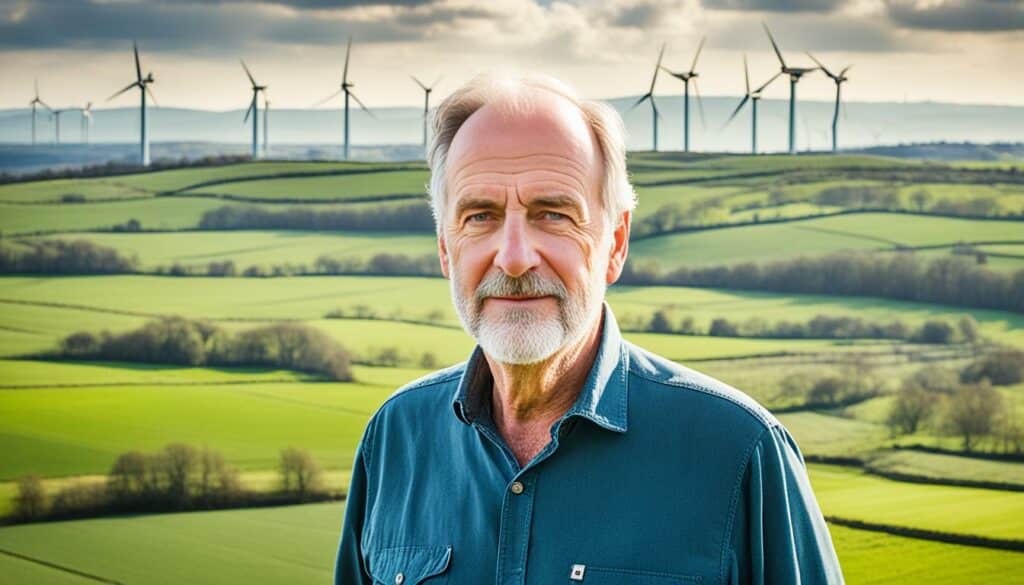
Reducing climate change effects in farming is hugely important. Since 1990, the UK farming sector has cut emissions by 12%. Yet, it’s predicted that by 2035, agriculture might contribute up to 20% of the UK’s total emissions. The Climate Change Committee says we must lower emissions even more, aiming for about 35 MtCO2e by 2050. This goal guides farmers to play a big part in protecting the environment.
Sustainable farming policies are driving changes in how farms are managed, through initiatives like the Environmental Land Management (ELMs) scheme. This scheme offers different programmes, such as the Sustainable Farming Incentive (SFI) and the Landscape Recovery scheme. These programmes provide bonuses to farmers who help with tasks like improving soil and water, and smart pest control. These steps are crucial for a future where farming is sustainable and productive.
| Farming Initiative | Key Actions | Financial Incentives |
|---|---|---|
| Sustainable Farming Incentive (SFI) | Improving soil health, water management | £27 to £97 per hectare |
| Landscape Recovery Scheme | Wild landscape restoration, tree planting | Project-based grants |
| Local Nature Recovery | Enhancing local biodiversity | Project-based grants |
Implementing these schemes makes it crystal clear why we must stick to environmental rules. Our move towards sustainable farming is both essential for the ecology and important for our economy. The Food Systems Economic Commission (FSEC) warns that global costs from harming the environment, hunger, and emissions could hit US$10 trillion yearly. By following through with strong environmental land management, the UK leads by example in ensuring farming and the environment can grow together.
The Agriculture Transition Plan 2021–2024 is a big change for UK farming. It brings in new rules under Defra’s guidance. It started on January 1, 2021. This plan says that by 2027, Direct Payments without a specific aim will stop. The money saved will go to help farming in new and green ways. This means farming will better care for the environment, animals, and cut back on harmful gases.
There are three main support levels to help in this change. They aim to push farming that’s good for the land. They also encourage creating spaces where wildlife can thrive. Plus, they help in making big changes to the countryside, like adding new forests and other essential services. All farmers and land owners will get some help. But, some help is specifically for those who need it most.
The Agriculture Transition Plan also includes ways for older farmers to retire smoothly. This makes room for new people who want to bring fresh ideas. This whole plan moves away from giving money based on farm size. Instead, it into greener and more helpful areas. It aims for a farming future in the UK that’s strong and takes care of the earth.
| Key Provisions | Description |
|---|---|
| Transition Period | Spanning from January 1, 2021, to 2027. |
| Reduction of Direct Payments | Gradual reduction and eventual cessation of untargeted Direct Payments. |
| Investment | Funds redirected to support environmental, animal welfare, and carbon reduction initiatives. |
| Support Levels | Three tiers designed for sustainable farming, nature recovery, and landscape-scale change. |
| Accessibility | Some supports are universally available; others are more targeted. |
| Exit Schemes | Facilitates retiring farmers, making room for new industry entrants. |
Defra is all set for these big farming changes. It wants UK farming to do really well while looking after the land. The new policy shows a strong aim for farming and the environment to work together. This way, farming can grow and be good for the planet.
In today’s world, cutting down on agriculture emissions is key. We can do this by aiming to reduce the carbon footprint in farming. This includes using more renewable energy in our farms and making sure we are using our resources efficiently.
We have made progress in lowering emissions since 1990 by 12%. The dairy sector has shown great improvement too. It has cut emissions by 12% from 2000 to 2020, even while making more milk. This was possible through better ways of managing livestock, using products to reduce methane, and precise farming.
Farming with renewable energy is crucial. In 2020, the UK got more electricity from renewables than from fossil fuels. Solar panels, wind power, and plants that turn waste into energy, like biomass, help cut emissions and save money. These steps are part of the UK’s goal to go carbon zero by 2050.
Managing farming resources well also helps cut emissions. Things like using water wisely, improving soil, and rotating crops can boost farming and protect the environment. Plans by Defra will help farmers show how they cut emissions and get money to support their efforts. The Sustainable Farming Incentive will encourage planting more trees and practices that absorb carbon and boost biodiversity.
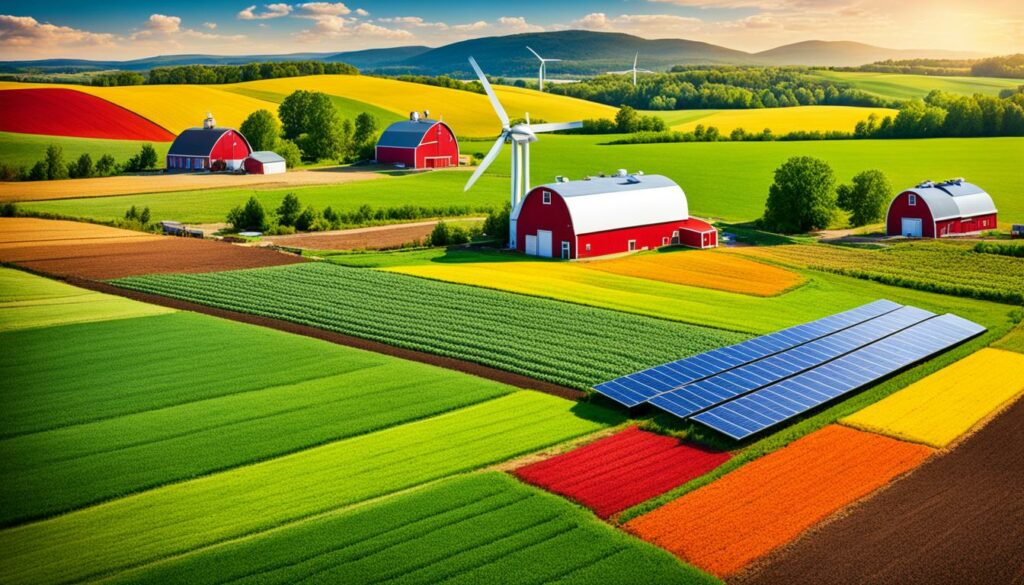
By using these methods together, farmers can make big cuts in their carbon footprint. This will help fight climate change and create a future where agriculture is sustainable.
The UK Climate Change Act is changing how farming works. Farmers are facing new challenges to help the environment. Nearly 10% of the UK’s emissions come from farming. Most of this is methane, produced mainly by animals. With 70% of the UK used for farming, it’s critical to tackle these issues now.
Farmers must change how they work to meet the UK Climate Change Act’s goals. Older farming ways and the usual economic rules are meeting new tests. These tests are to cut greenhouse gases. But, changing from grass to new crops brings new problems. This includes possible harm to the environment and its species.
Using new tech is key to farm productively and sustainably. For example, using precision tools and clean energy can cut down on harmful gases. Teaching farmers to use these new tools helps farm in smarter ways. This supports the Act’s goal for long-lasting farming growth.
Us, the buyers, can also help by what we choose to eat. Buying food made in good ways helps farms to be better for the planet. Our choices can make a big difference in pushing for eco-friendly products. This helps reach the Act’s positive goals for farming.
But, making these changes is hard. Over two-thirds of the UK’s farmland is grasslands. This makes it tough to switch to new farming methods. The UK’s plan is to smartly deal with these challenges. This ensures that farming remains key for food and jobs while protecting the planet.
Farming is crucial for food and the economy. Balancing its benefits with the harm it does is important. Using data to reduce harmful emissions is wise. The Agriculture Board suggests using a farm’s own data to make better choices.
In the end, the Act’s goal for zero emissions by 2050 needs everyone’s work. Farmers must not only follow new rules but also find new ways to grow. This challenge is about both meeting laws and growing in a better, sustainable way.
Using sustainable farming is key for the future of UK agriculture. This means taking care of the soil, using water wisely, and managing pests well. By working on these areas, farmers make sure their land stays productive and healthy for the long haul.
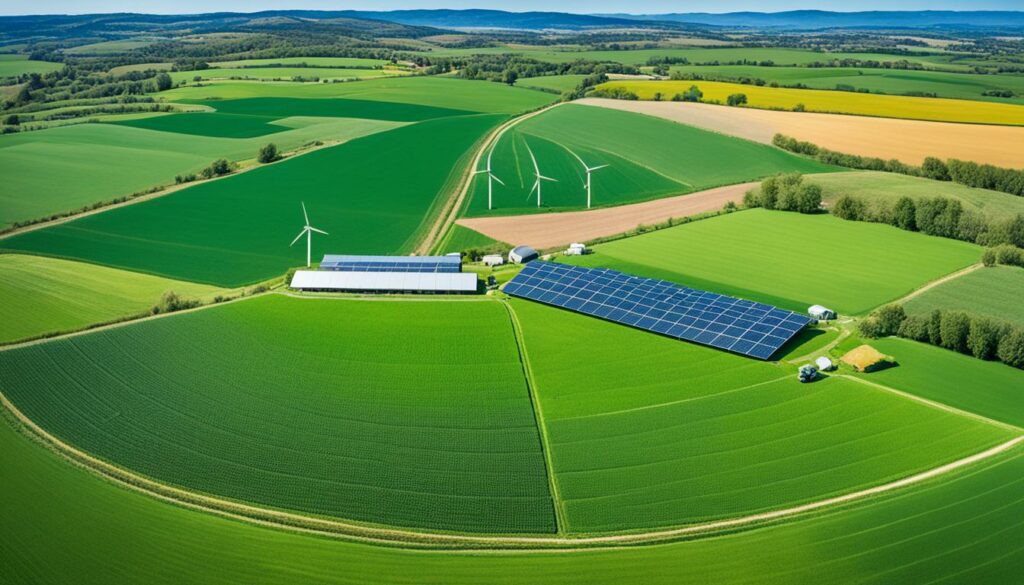
From 2021 to 2027, a big focus is on looking after the soil properly. Healthy soil helps crops grow better and holds more water. This is important for dealing with both floods and dry spells.
The UK’s Department for Environment, Food and Rural Affairs is working closely with 33 partners to help farmers. They aim to improve soil and water practices.
Using water carefully in farming is crucial. It means using smart watering techniques and not wasting water. This helps make the most of our water resources.
Integrated pest management (IPM) is all about keeping pests under control without harming the environment. It uses natural and mechanical ways to fight pests. This way, it reduces the use of harmful chemicals.
Farmers are moving towards these methods with the help of new government policies. These smart changes attract sustainable farming. They boost the number of plants, insects, and birds on farms. This shows how well IPM works for our farming and environment.
By following these practices, farming’s impact on the environment lessens. Healthy ecosystems and more biodiversity are the results. Farmers, backed by government help, are taking steps to create a greener and more sustainable future for agriculture.
The UK Climate Change Act came into force in 2008. It pioneers ambitious emissions targets crucial for the nation’s efforts against climate change. By 2050, the UK aims to slash its greenhouse gas emissions by at least 80% from 1990 levels, reaching net zero emissions.
This legislation on sustainable farming demands that the Government create carbon budgets every five years. These budgets focus on cutting greenhouse gas emissions. The aim is to meet specific targets. It also pushes for a detailed look at climate risks and National Adaptation Programme to handle emissions and climate change effects.
The Act introduced the Climate Change Committee (CCC). It’s an independent body that checks on emission cutting progress. This committee advises the Government on carbon budgets and important climate concerns. The Government must act on the CCC’s advice, showing its strong push for climate change actions.
This Act lets people challenge Government decisions that fall short of the Act’s climate goals via judicial review. It means the law allows anyone to take legal action if they think climate policies are not being properly enforced. This keeps policies in check. Scotland, Wales, and Northern Ireland have their own climate change rules too, adding to the UK’s efforts.
For agriculture, the Act sparks a move towards eco-friendly farming. It encourages the farming community to adopt green practices and be part of broader UK agricultural reform. Both national and local initiatives work together to support sustainable farming and nature protection.
The Act not only requires a change but offers a chance to innovate in agriculture. It’s about preparing the sector for future challenges. It seeks to make farming both resilient and eco-conscious for the coming years.
| Key Provision | Summary |
|---|---|
| Carbon Budgets | Set every five years to monitor and limit GHG emissions. |
| National Adaptation Programme | Assesses climate risks every five years and creates responsive policies. |
| Climate Change Committee (CCC) | Monitors progress on emissions reduction and advises the Government. |
| Judicial Review | Allows public and stakeholder challenges to policy decisions that are inconsistent with the Act. |
| Devolved Administrations | Northern Ireland, Scotland, and Wales have their own complementary climate change legislation. |
The UK’s 25 Year Environment Plan is a pledge to fully care for our world. It puts a big focus on the farm sector. The plan aims to assist farmers in being both money-wise and planet-friendly. This is important for a strong, green farm scene.
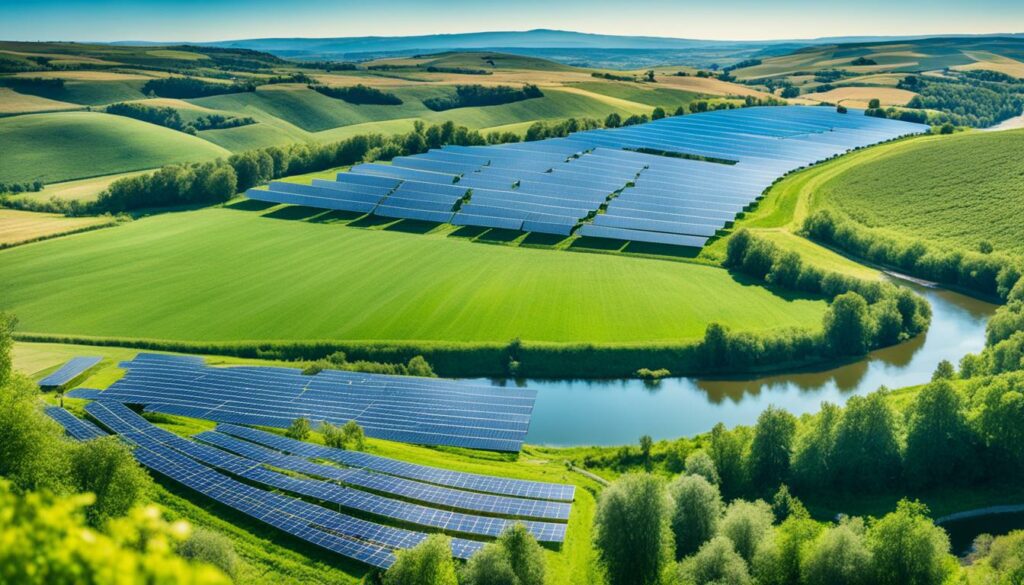
This Plan aims for farming to achieve net zero emissions. It wants big changes in how we use the land and farm. By 2030, 65 to 80% of farmers should be nature-friendly on some of their land. The goal is to lower harmful gases by farming smarter.
Farming plans to help bring back or create over 500,000 wild areas by 2042. This will meet about 80 to 100% of a big aim.
Key to the UK goals are the Environmental Land Management Schemes. They offer support to farmers for doing better by the planet. These schemes help with climate improvements and protecting nature in farming areas.
Eventually, farming should make 75% of special sites better by 2042. 50% of that betterment will come from these schemes.
The plan has big targets. It wants more trees, 66% better water storage use, and cleaner water. There’s also a focus on protecting trees from pests through the Tree Health Pilot.
However, a report by the Office for Environmental Protection found the government is lagging on its goals. It states struggles in seven out of 10 areas. This is due to not fully meeting policies and using resources properly. To fix this, they suggest better management and clearer goals.
Climate change is a big challenge for farms. The UK government wants to help farmers deal with it. This help includes money and new tech for farming. As the Environment Secretary, I see these steps as vital. They help farms last longer and do better, even with the changes in climate.
Farmers in the UK need financial help now more than ever. The government started the Environmental Improvement Plan. It’s a five-year plan to help nature and stop farms from damaging it. This plan offers grants for looking after the environment. It also supports ways of farming that save food and protect nature.
| Support Programme | Objective | Duration |
|---|---|---|
| Environmental Stewardship | Encourage sustainable land use | 5 years |
| Agri-Tech Innovation | Promote cutting-edge farming technologies | Continuous |
| Sustainable Farming Incentive | Support for eco-friendly farming practices | Rolling |
Using new tech in farming can make a big difference. I visited the US and saw great examples. Like the North Carolina State University’s work on plants and the Alexandria AgTech Centre. These places showed me how new tech can make farming better and greener.
New tech can improve how farms work and are kinder to the planet. Things like smart farming techniques and clean energy can make a big impact. These changes are good for making farms both profitable and look after our world.
Combining money help and new tech is key to improving farms in the face of climate change. By focusing on these, we can create a strong and green future for farming. With everyone working together and smart rules, we can change farming for the better for our children and beyond.
Animal welfare and the environment are closely linked. They shape how farming is done and the future of agriculture. Good farming practices not only care for animals but also help build trust with consumers. They follow the UK’s welfare laws. The use of sustainable farm practices helps the environment too.
The need for animal products is set to grow. By 2050, it could double. Yet, making sure animals are well treated isn’t always a top goal in farming. Vets are crucial in looking after the health and wellbeing of production animals. They check on their health, prevent sickness, and promote safer farming methods. This helps farms to produce food well without harming the environment.
Vets also check and approve animal product trades. This helps the economy, keeps people healthy, and ensures food production is sustainable. The aim is for animal farming to meet our needs now without harming the future’s ability to do so. For farming to be sustainable, it must look after animals well.
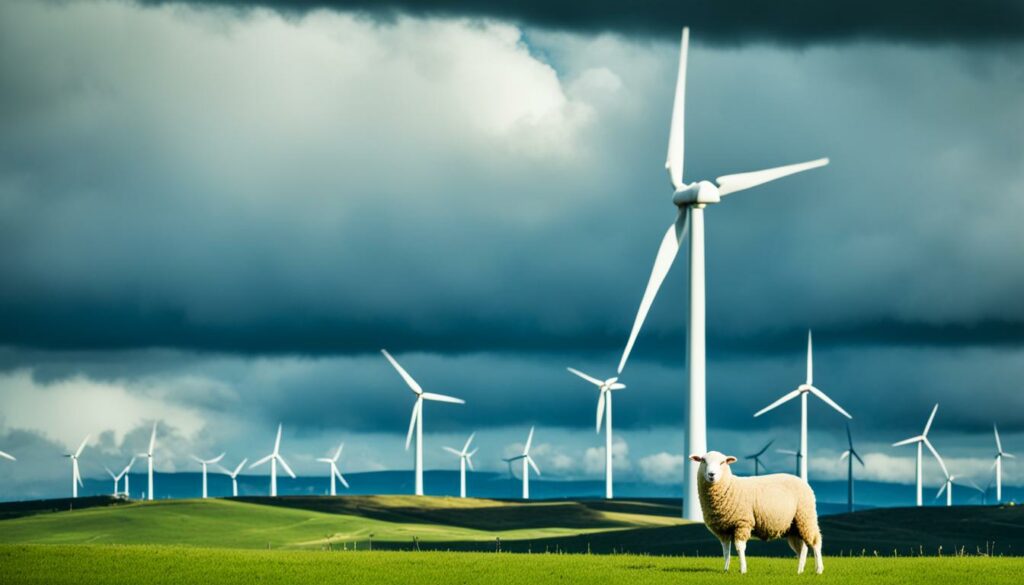
Policies should make sure farms use natural resources wisely and take care of the wild. They should protect spaces for animals to live and keep the variety of life (biodiversity) rich. Making animals healthy and happy is vital for farming to last. Using new methods and technology, like smart breeding, can help. These changes support good and responsible farming. The government should encourage and back these efforts.
The Farm Animal Welfare Committee (FAWC) checks on how farming affects animals. They look at different farms, including those for dairy and chicken. They want to make sure animals have what they need to live well. The Five Freedoms idea, made by the FAWC, gives animals rights like not being hungry, being comfortable, and not scared. These things are very important for animal welfare.
There are many projects focused on animal welfare. Groups like Welfare Quality and the FAI watch over how animals are treated on farms. They check on things such as how much they can move and if they’re in pain. This is a big part of making sure farms work well without harming the environment. Better animal welfare often comes with more food and a cleaner environment.
The UK Climate Change Act has brought new challenges to farmers. Moving from traditional subsidies to greener funding is hard. But, with the right support, farmers can adapt well.
Educating farmers is key to making UK farm policies work. Training helps them use sustainable farming methods. This boosts both their yield and meets environmental goals set by the Climate Change Act.
Working together is vital in facing the tasks of greener farming. The government, farming groups, and farmers join forces. They share ideas, support research, and use new tech to cut carbon while farming efficiently.
Using renewable energy in farms has a big positive impact. Nearly half of the UK’s power came from renewables in 2020. Programs like the Smart Export Guarantee help farmers afford this. They can cut emissions and save money.
Restoring 55-70% of UK peatlands could reduce annual land emissions by about 10%, significantly contributing to the nation’s net zero targets.
Managing resources well is also vital for sustainable farming. Advanced farming techniques and better water and soil care help. By using these methods, farming can have less environmental impact and more yield.
| Challenges | Solutions |
|---|---|
| Financial structure changes | Streamline funding mechanisms |
| Adaptation to new policies | Comprehensive training programmes |
| Integration of sustainable practices | Collaboration and innovation |
| Reducing carbon emissions | Renewable energy integration |
| Efficient resource management | Precision agriculture techniques |
By working together and focusing on education, innovation, and resource management, we can meet the challenges of greener farming. This not only helps the UK reach its climate goals but also ensures a sustainable farm future.
To make the UK greener, we must all work together. This means partnerships and using everyone’s skills. By doing this, we make sure farming goes green in the right way.
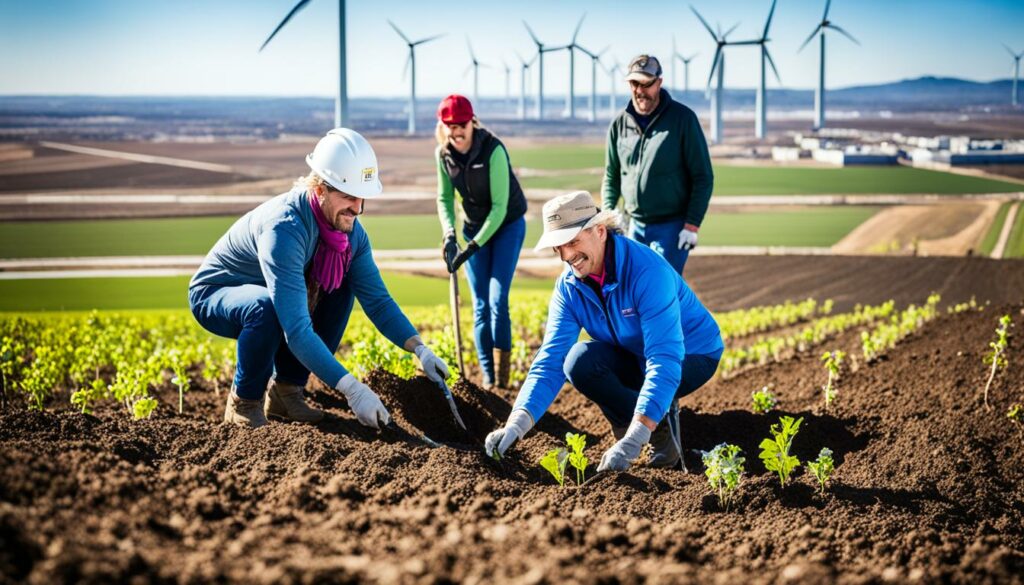
Working together is key for change. Governments and farmers need to team up to turn plans into real acts. Acts that make our lands green and safe for the future.
For these plans to work, they need money. The UK gives lots of money for new ways to farm that are green. This helps make sure farmers use smart, new ways based on science.
NGOs have a big job in making farms greener. Groups like Climate Northern Ireland work to fight climate change, making sure farms are ready for the future. Their work follows big world plans, like the Paris Agreement, to keep our Earth safe.
Big companies are also doing their bit. They’re promising to use less of our Earth’s resources. For example, OVO Energy wants to plant lots of trees. Severn Trent is fixing lands, and Burberry is choosing green materials. These efforts show that many are working together towards a green, healthy Earth.
| Stakeholder | Contribution | Impact |
|---|---|---|
| Government | Policy formation, financial grants, frameworks | Less greenhouse gases, better prepared for future |
| Farmers | Use new eco-friendly methods, farm in smart ways | Helps nature, keeps farms productive |
| NGOs | Talk and work with people, find new ways to help | Teaches others about being green, puts best methods to use |
| Private Sector | Put money in new ideas, promises to be kind to Earth | Makes green change faster, helps save planet |
The issue of climate change affects 40% of the world’s people. This makes sustainable farming crucial. Looking at successful sustainable farming in the UK offers great insights. It shows how innovation and hard work can help in agriculture. This is important as climate change could push 130 million more people into poverty over the next ten years.
These examples in the UK highlight practical, successful sustainable farming. Many food and retail companies are working to achieve Net-Zero emissions. They aim to do this through the Science-Based Targets Initiative (SBTi). They focus on Scope 3 emissions, which includes all supply chain emissions. This shows how everyone in the supply chain affects sustainable farming.
Sustainable farming is about real actions that bring real change. The horticulture sector, for instance, has set out to lower emissions from transportation, processing, packing, and farming. In Kenya, where women play a big role in farming, including them in training boosts productivity. This method leads to a 36% higher output in farms where both men and women receive training. It proves that inclusion is key to sustainable farming.
Studying UK’s sustainable farming teaches us important lessons. We learn that tailor-made policies and economic support can change how farmers act. For example, Scotland shows that educating farmers about climate change leads to green practices. These insights help in making global farming more sustainable. We must keep integrating such lessons into policies. This way, we can ensure that farming remains productive while protecting the environment.
The UK Climate Change Act works to improve how we look after the land. It helps make our food production and the environment better. This law guides farmers to use sustainable methods. It aims to lower the carbon emissions from farming.
The Agricultural Transition Plan 2021–2024 offers a path for UK farmers to become more eco-friendly. It is designed by Defra to support and guide farmers. It plans to replace some payments with the Sustainable Farming Incentive. It also encourages nature and landscape recovery.
To cut down on emissions, experts suggest a few things. Farmers can learn to lower their carbon footprint. They can start using more renewable energy. And they should manage resources, like water, better. Doing these things not only helps the planet but can also boost their farms.
Environmental laws help make farms friendlier to our planet. They push for efforts that fight climate change. These policies help farmers care for their land and water better. By following them, farms can be greener and more productive.
The UK Climate Change Act changes how farmers do things. They now have to farm in ways that are better for nature. This brings both challenges and chances for farmers to try new ways. It pushes for more eco-friendly and innovative farm practices.
Soil health and water use are vital for a strong farming ecosystem. Taking good care of the soil and water lessens the impact of farming on the earth. It also helps wildlife by keeping the environment healthy.
The 25 Year Environment Plan aims for big improvements in the environment, especially in farming. It wants to reach net zero, meaning no harmful emissions. This plan supports changing how we use the land to meet these goals.
The UK government offers money and help to farmers going green. It focuses on using new tech and methods to farm better. This support also aims to keep farmers profitable while they protect the environment.
Animal care is a key part of the UK’s efforts to go green. The Climate Change Act includes rules on good farming for animals. These rules not only help the planet but also meet the public’s and the law’s expectations.
Getting environmental schemes running can be hard because of new rules and money changes. The key is to teach and support farmers so they can use these new policies well. They need to adapt and find new ways to protect the environment without losing productivity.
By working together, the government, farmers, and others can make green policies work. They encourage new ideas and help out with resources. These partnerships make it easier for farmers to go green, which is good for everyone.
Looking at successful farms can teach us a lot about good environmental policies. They show how hard work and smart thinking can make a difference. By studying these success stories, farmers and officials can find the best ways to balance farming with protecting nature.